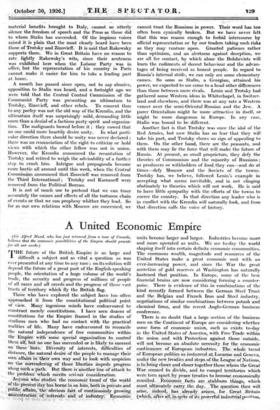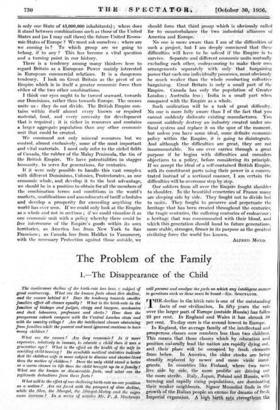A United Economic Empire
(Sir -Mired Mond, who has just returned from a tour of Canada, 'believes that the economic possibilities of the Empire should provide for all our needs.) rilHE future of the British .Empire is as large and difficult a subject and as vital a question as was ever presented at any time to any race ; on its solution will depend the future of a great part of the English-speaking people, the orientation of a _huge volume of the world's trade, the security and progress of millions of people of all races and all creeds and the progress of those vast tracts' of territory which fly the British flag.
Those who have explored the subject have too often approached it from the constitutional political point of view. Many ingenious minds have endeavoured to construct merely constitutions. I have seen dozens of constitutions for the Empire framed in the studies of studious men who had no contact with the practical realities of life. Many have endeavoured to reconcile the natural independence of free communities within the `Empire - with 'amine special organization to control them all; but no one. has succeeded or is likely to succeed on these lines.' Diversity of interests, difficulties Of distance, the natural desire of the people to manage their own. affairs -in 'their own way and to look with suspicion on -the surrendering Of those liberties impede progress along such a path. But there is- another line of attack 'to the problerri which merits serious Consideration.
AnYone Who studiei the economic trend" of the world of the present 'day has borne in on him; bOth in private and public affairs, the-obvious .ftiet of continuously growing ' edneentration- of interests and of industry:. Eco. • units become larger and larger. Industries become more and more operated as units. We sec to-day the world shaping itself into certain definite economic communities. The enormous wealth, magnitude and resources of the United States make a great economic unit with an ever-increasing power, and since the War the great accretion of gold reserves at Washington has naturally .hastened that position. In Europe, some of the best financial brains are now considering forming a counter- - poise. There is evidence of this in combinations of the kind recently formed between the German Steel Trust and the Belgian and French Iron and Steel industry, negotiations of similar combinations between potash and chemical firms, and the recent Anglo-German business conference.
There is no doubt that a large section of the business men on the Continent of Europe are considering whether some form of economic union, such as exists to-day in the United States of America, with Free Trade within the Union :and with Protection against those outside, will not. become an absolute necessity for the economic continuance of European industries. • The. whole trend of European pOlitics as. instanced at:Lopata° and Geneva, under the new, treaties and steps of the League of Nations, is to:bring closer and closer together those whom the Great War. seemed to divide, and to compel territories which were torn ,apart, by peace treaties to become economically reunited.., Economic .faots arc. stubborn things, which must ultimately carry the, day... The question then will arise, indeed, haS already ariSen, :for. Great Britain (which, after all,Th spite of its .powerful industrial pogit is only one State of 45,000,000 inhabitants) ; where does it stand between combinations such as those of the United' States and (as I may call them) the future United Econo- mic States of Europe ? We must ask ourselves : where are we coming in ? To which group are we going to belong, if to any ? This has become a vital question and a turning point in our history.
There is a tendency among many thinkers here to regard Britain as a European Power mainly interested in European commercial relations. It is a dangerous tendency. I look on Great Britain as the pivot of an Empire which is in itself a greater economic •force than either of the two other combinations.
I think our eyes ought to be turned seaward, towards our DeminiOns, rather than towards Europe. The oceans unite us : they do not divide. The British Empire con- tains within itself- almost every known or required material, food, and every necessity for development that is required ; it is richer in resources and contains a larger aggregate population than any other economic unit that could be created.
We command not only mineral resources but we control, almost exclusively, some of the most important and vital materials. I need only refer to the nickel fields of Canada, the rubber of the Malay Peninsula, the tin of the British Empire. We have potentialities • to stagger humanity, to serve for generations, for centuries.
If it were only possible to handle this vast complex with different Dominions, Colonies, Protectorates, as one economic whole, and develop it to the best advantage, we should be in a position to obtain for all the members of the combination terms and conditions in the world's markets, modifications and amendments of tariff schedules and develop a prosperity far exceeding anything the world has ever seen. If we could only look at the Empire as a whole and not in sections ; if we could visualize it as one economic unit with a policy whereby there could be free intercourse of the Empire's goods within its own territories, as America has from New York to San Francisco ; as .Canada has from Halifax to Vancouver, with the necessary Protection against those outside, we should form that third group which is obviously called for to counterbalance the two industrial a/liances of America and Europe: • No one is more aware than I am of the difficulties of such a project, but I am deeply convinced that these difficulties will have to be solved if- the -Empire is to survive. Separate and different economic units mutually excluding each other, endeavouring to make their own arrangements separately with only. that bargaining power that each one individually possesacs, must obviously be .much weaker than the whole conducting collective bargaining. Great Britain is only a small part of the Empire. Canada has only the population of Greater London ; Australia less ; -India is a small part when compared with the Empire as a whole. - Such unification will be a task of great difficulty.
No one is more fully aware than I of the fact that you cannot suddenly dislocate existing manufactures. You cannot suddenly destroy an industry created under one fiscal system and replace it on the spur of the moment, but unless you have some ideal, some definite economic policy within the Empire, it is are to disintegrate. And although the difficulties are great, they are not insurmountable. No one ever carries through a great purpose if he begins with difficulties and considers objections to a policy', before considering its principle. If we accept the ideal of a self-contained. British Empire, with its constituent .parts using their power in a concen- trated instead of a sectional manner, I am certain the difficulties will be overcome step by step.
Our soldiers from all over the Empire fought shoulder to shoulder: In the beautiful cemeteries of France many are sleeping side by side. They fought not to divide but to unite. They fought to preerire and perpetuate the heritage that has been created throughout the centuries, the tragic centuries, the suffering centuries of endeavour ; a heritage that was consummated with their blood, and which this-- generation should hand to future generations, more stable, stronger, firmer in its purpose as the greatest civilizing force the world has known. .
ALFRED MOND.



























































 Previous page
Previous page